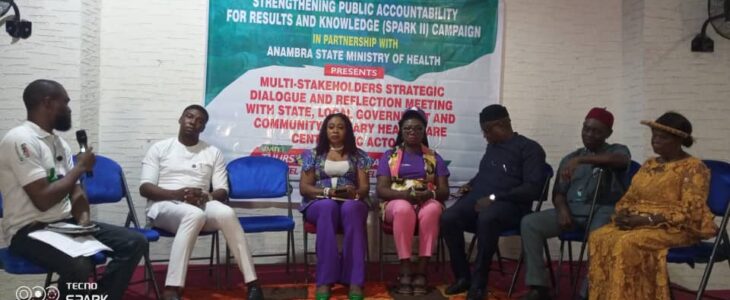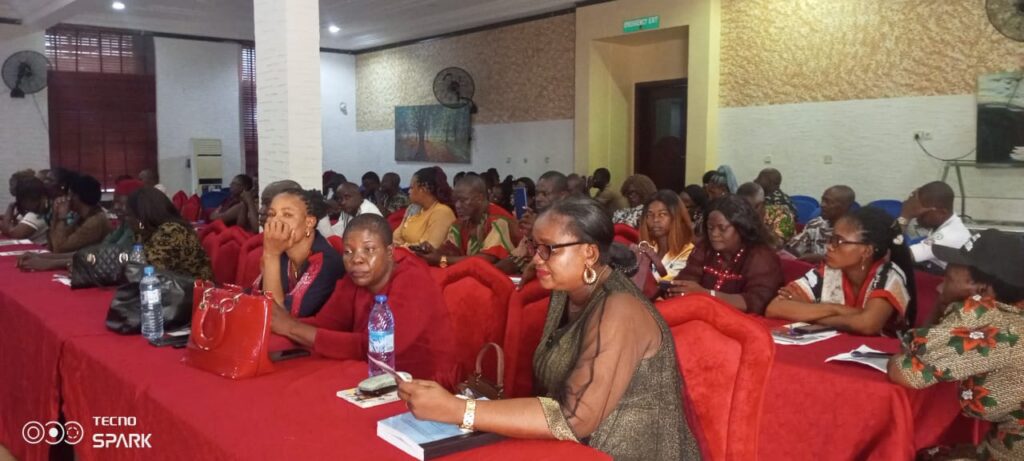
From Ifeoma Ejiofor

Justice Development and Peace Caritas (JDPC), Nnewi on Thursday partnered Community Empowerment Network (COMEN) Civil Rights Concern (CRC) and Anambra State Ministry of Health to organize a multi-stakeholders dialogue and reflection session under the Strengthening Public Accountability for Results and Knowledge (SPARK 11) project.

In his opening address, Very Rev Fr. Ben Okolo, Director, JDPC Nnewi, highlighted the activities and achievements of SPARK 11 project, noted that the dialogue session is meant to reflect on the roles of the government at State and Local Government Areas, as well as Community PHC actors in sustaining the gains the state has recorded in its primary health care delivery system especially maternal and child health.

“I am confident that today’s education will see a new kind of light in comprehensive, inclusive, active learning that instils collaborative decision-making, advance accountability, and enhance the foundation for long-term improvement in primary health care delivery. Together, we will build a transparent network of state, local, and community primary health care actors, ensuring that performance and best practices become an integral part of our health systems for the world”.
Anambra State Commissioner of Health, Dr Afam Obidike commended JDPC and other organizations implementing the SPARK 11 campaign for organizing the forum.
He highlighted some of the outstanding investments of Gov Soludo’s administration has made in the health sector which according to him included employment of forty-two medical doctors for the twenty one council areas in the state to implement its telemedicine innovative project.
The chairman of all the Supervisors of Health in Anambra State, Dr Nkem Okeke in his own comment, stressed the importance of primary health centres which according to him, are not meant for the poor but for everyone in the community.
Dr Okeke while appealing to JDPC and partners to think of taking the program to the grassroots for maximum impact, stressed the need for Officers in Charge (OIC), Ward Development Committee (WDC) and supervisors of health to work together for the benefit of all and sundry.
In his goodwill message, the State Hospital Administrator, Frank Ibeneme urged the participants to make good use of the seminar and interventions of the state government, especially as Governor Soludo has proven to be a health-friendly governor.
Executive Secretary, Anambra State Primary Health Care Development Agency, Pharm Chisom Uchem, noted that quality health provision at the PHC level demands that communities key into the Public Private and Community Partnership (PPCP), which has been tried, tested and is working in the state.
She equally lauded the SPARK 2 team for the support being given to the state while also calling on health workers at the PHCs to treat patients as kings who deserve respect and empathy.
Consultant for the project, Mrs Ugochi Ehiahuruike and Executive Director, Social and Integral Development Center presented a paper on enhancing understanding of system change and the role of key community actors in achieving sustainable Mother and Child Health (MCH) services.
She identified system change in Anambra State Primary Health Center as free antenatal and delivery, upliftment of facilities, increased staff strength, attempts at computerization of Primary Health Centers(PHCs) Free cesarian operation, well trained nurses and telemedicine.
Mrs Ehiahuruike, revealed that all the LGAs in the state have at least one functional General Hospital all thanks to Gov Soludo.
Okey Onyeka of Civil Rights Concern (CRC) presented a quarterly budget performance of Health Ministry for the purpose of transparency and accountability.
He stressed the need for individuals to familiarize themselves with the resources at the disposal of the government which he noted would assist them to constructively engage with the duty bearers.
The Executive Director of CRC noted that budget trend in Anambra State has not been in conformity with the directives that health sector should take minimum of 10 percent of the total budget.
